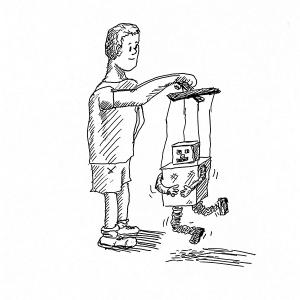Why ADHD Brains Are Harder for AI to Replace
Less Predictable Humans Are Harder to Replace With Machines
OJAI, CA, UNITED STATES, October 3, 2025 /EINPresswire.com/ -- As artificial intelligence races ahead, one overlooked truth may determine humanity’s edge: the “unpredictable” ADHD brain is harder to study, harder to copy—and harder to replace.
AI vs. ADHD
While AI excels at replicating predictable patterns, ADHD brains thrive on adaptability, rapid-fire pattern recognition, and unconventional problem-solving. These very traits—often labeled as deficits—may prove to be indispensable in an AI-dominated future.
“AI can copy predictability—but it can’t copy unpredictability. ADHD brains are wired to surprise, and that’s our survival advantage,” says author and parenting advocate Roman Wyden. Jobs based on repetitive tasks and strict schedules are already being automated, with experts predicting up to 40% of roles will vanish in the coming decade. Yet the same qualities that once put ADHD children at odds with traditional classrooms—hyperfocus on passions, creative leaps, nonlinear thinking—are the very skills needed to innovate, adapt, and lead alongside AI.
ADHD AND THE FUTURE OF WORK
Jobs based on repetitive tasks and strict schedules are already being automated, with experts predicting up to 40% of roles will vanish in the coming decade. Yet the same qualities that once put ADHD children at odds with traditional classrooms—hyperfocus on passions, creative leaps, nonlinear thinking—are the very skills needed to innovate, adapt, and lead alongside AI. Motivational leader Tony Robbins recently highlighted on the PBD Podcast three essential skills for the future: Recognizing Patterns, Using Patterns, and Creating new Patterns. “With those skill sets—that’s how my kids will do well. If you can learn rapidly and recognize patterns, there’s nothing you can’t do well at,” Robbins said.
Neuroscience supports this view. The basal ganglia, a group of subcortical brain structures, plays a crucial role in pattern recognition, habit formation, and reward-based learning. Individuals with ADHD and ASD often excel in precisely these domains—whether in chess, music, or martial arts such as Jiu Jitsu, which depends on anticipating and exploiting opponents’ moves.
A COMING SHIFT IN "NORMAL"
In a future where AI handles routine tasks, human value will increasingly lie in creativity, strategic thinking, and emotional intelligence. These are precisely the areas where ADHD traits shine. Wyden believes society is on the cusp of a fundamental re-evaluation of what “normal” means: “With so many individuals diagnosed—or undiagnosed—ADHD and autism may already represent the majority. Neurodiversity could well be the new normal. The real challenge is whether our schools, workplaces, and cultural systems can catch up.”
A FATHER'S JOURNEY
Wyden’s insights come not just from theory but from experience. When his seven-year-old son was diagnosed with ADHD in 2016, he felt immediate skepticism. Rather than accept the label at face value, he trusted his instincts and embarked on a decade-long journey to uncover the deeper truth. His findings—recently echoed in The New York Times Magazine article “Have We Been Thinking About ADHD All Wrong?” by Paul Tough—are revealed in his bold new book ADHD IS OVER!, launching October 3, 2025 on Amazon.
A filmmaker turned parenting advocate, Wyden has interviewed leading experts in neuroscience, trauma, and child development on his podcast ADHD IS OVER, including Dr. Gabor Maté, Dr. Bessel van der Kolk, Dr. Steven Porges, Dr. Bruce Lipton, Dr. Peter Levine, and Dr. Erica Komisar. Their collective wisdom underscores a radical new idea: ADHD is not a disorder to be fixed, but a set of strengths to be cultivated.
Roman Wyden
ADHD IS OVER
+1 818-642-2236
email us here
Visit us on social media:
LinkedIn
Instagram
Facebook
YouTube
X
ADHD IS OVER! Documentary Teaser
Legal Disclaimer:
EIN Presswire provides this news content "as is" without warranty of any kind. We do not accept any responsibility or liability for the accuracy, content, images, videos, licenses, completeness, legality, or reliability of the information contained in this article. If you have any complaints or copyright issues related to this article, kindly contact the author above.



